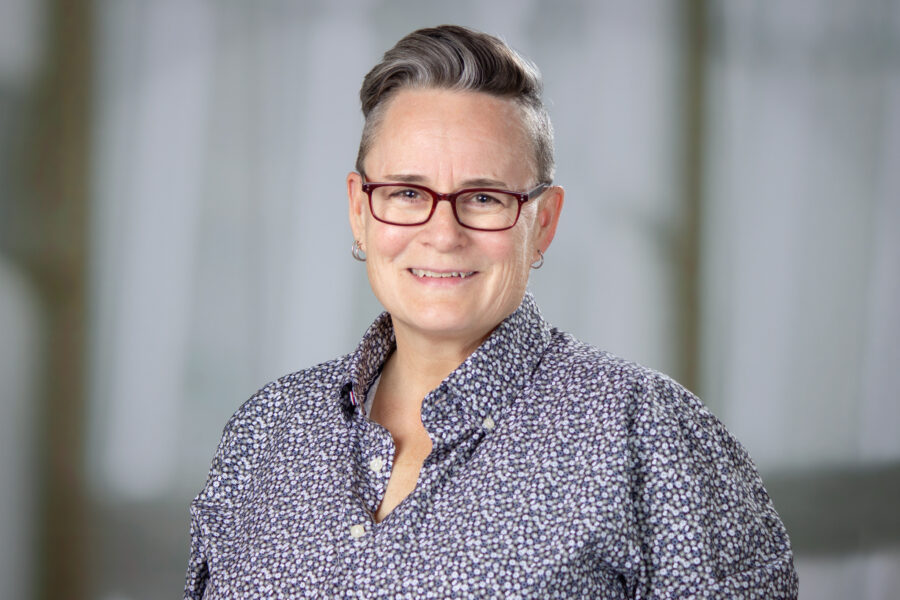A stay in the neonatal intensive care unit can be daunting.
Newborns may be hooked up to tubes and wires. Other tiny patients might be kept in covered Isolettes, making it tough to get a good look at them. Some can’t be held right away.
Cara Solness, PhD, assistant professor in the Munroe-Meyer Institute Department of Psychology, works in the NICU to help parents navigate the stressors of having their infant hospitalized.
Dr. Solness’ specialty is NICU psychology. They are embedded in the NICUs at the Nebraska Medical Center and Children’s Nebraska.
The role is twofold: helping parents cope with the stress and trauma of their child’s stay; and supporting infant development.
NICU stays come with increased risk for developmental delays. The best outcome is sending children into the healthiest homes possible.
“If we can get parents to feel better and get more comfortable with interacting with their children, that can lead to shorter stays and better developmental outcomes,” Dr. Solness said.
NICU parents are between 30% and 40% more likely to experience perinatal mood or anxiety disorders. A host of factors can contribute, including a traumatic birth, trying to balance demands outside of the NICU, worry about the newborn or not being able to hold the baby immediately after birth.
“It is an atypical introduction to parenthood,” Dr. Solness said. “Bonding and attachment can be a concern and that separation from the parent role. A large team of medical personnel is more responsible for the baby than the parents are in the early days after admission.”
At the beginning of the process, Dr. Solness is with families to listen and validate experiences, process trauma, and adjust to their new normal.
“It’s helping parents feel a little less helpless with their baby and helping them see that being near their baby, talking to their baby and providing a comforting touch helps build their bond, helps soothe baby’s pain response, and provides social touch,” Dr. Solness said. “There’s a dual purpose at the beginning of helping to contain and process the trauma, so that it hopefully doesn’t manifest into bigger concerns, and then trying to empower caregivers in their parent role.”
As families progress, Dr. Solness works with them on interacting and communicating with the medical team. Sometimes the work is centered around tolerating delays with being discharged or coping with medical complications.
Dr. Solness follows up with families once they’re discharged to see how they are adjusting to home and what needs they have. Sometimes families need additional support and choose to work with Dr. Solness as an outpatient, other times they’re referred to other providers.
Being in-house at MMI is ideal, Dr. Solness said. It allows for families to be referred to them from other services, like the TIPs program, or other colleagues in the psychology department. In the other direction, Dr. Solness connects families with other professionals around the institute and the wider community.
Dr. Solness also has a grant through the Munroe-Meyer Guild to try implementing telehealth in NICUs. Hospitals contributed to the purchase of iPads, iPad stands and IT support. The guild grant provided other supports, like high contrast books to be used with babies during telehealth sessions as well as Polaroid cameras to document milestones during telehealth.
“It’s basically trying to facilitate the same work I do in the NICU but through an iPad for families who can’t be in the NICU regularly.”
NICU psychology is a growing field. Dr. Solness is the first in Nebraska to be embedded into a NICU.
“As a field, we’re starting to be able to train our interns and post docs in this specialty so then they’re ready to step into a NICU. It’s a different way of doing mental health work and it requires the specialty training.”
It’s a good feeling, said Dr. Solness, to know that families are doing well and babies are meeting milestones after going home and that you have been able to be a part of supporting them.
“It’s such a privilege to work with families when they’re in one of the most difficult times of their lives. They let you come into their world to try to help them,” Dr. Solness said.
